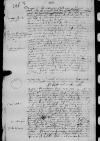Letter #2927
[Ioannes DANTISCUS] to [Stanisław] KOSTKAHeilsberg (Lidzbark Warmiński), 1546-03-06
Manuscript sources:
| ||||
Text & apparatus & commentaryPlain textText & commentaryText & apparatus
H(ern)
Unsern(n) etc.
Ko(niglich)e co(m)mission schick wir E(wer) H(erlichkei)t wider, von der text damaged⌈[er]er text damaged⌉ wir nicht ehe wissen(n), / biss das sie Ewer Herlichkeit durch superinscribed in place of crossed-out von⌈von E(wer) H(erlichkei)t durch Ewer Herlichkeit durch superinscribed in place of crossed-out von⌉ denn(n) fiscal werden sunst die zceit aber uff negst(en) den h(e)rn co(m)missarien w[...] text damaged⌈[...][...] text damaged⌉ lossen vorbring(en), / die zceit aber zu...handen(?) die co(m)mission on the margin⌈zu... illegible⌈...... illegible⌉handen(?) die co(m)missionzu...handen(?) die co(m)mission on the margin⌉, / ab wir drey tage [...] text damaged⌈[...][...] text damaged⌉ czeit biss superinscribed⌈bissbiss superinscribed⌉ uff den montag noch remi(ni)scere[1], / das wir den tag zu komen(n) / und darnoch den dingstag zu frwer zceit die sache vorgenomen(n) / Ew(e)r H(erlichkei)t bittend, die alte herberge zu halten, / von uns vor gut nemen(n), / was dies haus wirt gebn(n). / Den sontag text damaged⌈[ntag]ntag text damaged⌉ vor remi(ni)scere ist unser zceit prister / und ander gesta[...] text damaged⌈[...][...] text damaged⌉ standes / mit gotlicher(r) hulff zu wegen etc. Disse meinung, [...] text damaged⌈[...][...] text damaged⌉ die uns ko(niglich)e m(ajeste)t frey hot gegebn(n), wie die eingelegte copey mitbringt, on the margin⌈ die uns ko(niglich)e m(ajeste)t frey hot gegebn(n), wie die eingelegte copey mitbringt, die uns ko(niglich)e m(ajeste)t frey hot gegebn(n), wie die eingelegte copey mitbringt, on the margin⌉ wir ouch in beigelegt(en) briven den andren h(e)rn co(m)missaren der
Dat(um) a(us) u(nserm) s(loss) H(eilsberg), den text damaged⌈[
Postscript:
Wir bitt(en), E(wer) H(erlichkei)t wolde bey uns die negste herberg halt(en) / [...] text damaged⌈[...][...] text damaged⌉ser haus zcyhen und vorgutt haben(n). / Was das selbte wirt [...] text damaged⌈[...][...] text damaged⌉.

 BCz, 245, p. 296 (t.p.)
BCz, 245, p. 296 (t.p.)